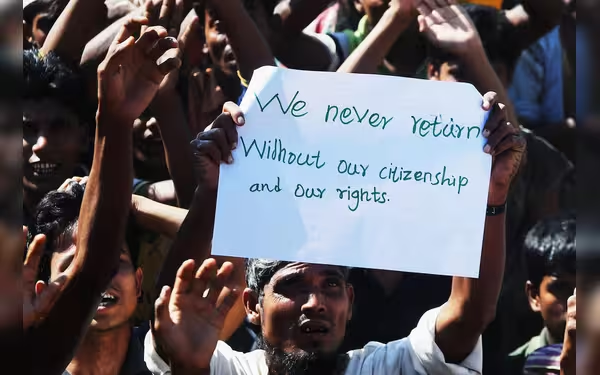Saturday, November 16, 2024 11:57 PM
UNHCR Reports Over 500,000 Stateless Individuals Granted Citizenship
- Over 565,900 stateless individuals gained citizenship in a decade.
- UNHCR's #IBelong campaign mobilized international action.
- Twenty countries improved rights for stateless people.
 Image Credits: arabnewspk
Image Credits: arabnewspkUNHCR reveals over 500,000 stateless individuals acquired citizenship in the last decade through the #IBelong campaign.
In recent years, the issue of statelessness has gained significant attention on the global stage. Statelessness occurs when individuals are not recognized as citizens by any country, leaving them without the rights and protections that come with nationality. This situation can arise due to various reasons, including ethnic, religious, or gender discrimination, as well as flaws in nationality laws. The United Nations High Commissioner for Refugees (UNHCR) has been at the forefront of efforts to address this pressing human rights issue.
On Friday, the UNHCR announced that over half a million stateless individuals have acquired citizenship in the past decade, thanks to its #IBelong campaign launched in 2014. This campaign aimed to mobilize international action to resolve the problem of statelessness, which the UN describes as "a major human rights violation." The agency highlighted that stateless individuals often face political and economic marginalization, making them vulnerable to exploitation and abuse.
According to the UNHCR, there are currently 4.4 million stateless people recorded worldwide, but this figure only represents about half of the countries globally. The campaign, which is set to conclude this year, sought to shed light on the "invisible crisis" faced by millions living without a nationality. Filippo Grandi, the UNHCR chief, emphasized that while significant progress has been made, "our work is not yet done." Over the past decade, more than 565,900 stateless individuals and those with undetermined nationality have gained citizenship.
Notable progress has been made in various countries. For instance, Australian actor Cate Blanchett, who serves as the UNHCR’s goodwill ambassador, praised the efforts, stating that "twenty countries have improved rights for stateless people, and thirteen countries have passed laws to ensure that no child is born stateless." This is a significant step forward in ensuring that every individual has the right to be recognized and included in society.
The UNHCR also highlighted the positive actions taken by several nations, including Turkmenistan, Portugal, North Macedonia, Rwanda, Brazil, and Thailand. Kyrgyzstan has successfully resolved all known cases of statelessness within its borders. Furthermore, 77 additional countries have joined the UN Statelessness Conventions, and at least 22 countries have adopted national action plans aimed at ending statelessness.
Despite these advancements, Ruven Menikdiwela, UNHCR’s assistant high commissioner for protection, pointed out that there are still countless individuals who "do not exist on paper" and are marginalized due to discrimination or flaws in nationality laws. The need for further action remains critical, as many continue to live on the fringes of society.
As the #IBelong campaign comes to a close, the UNHCR plans to host a high-level meeting on statelessness during its executive committee meeting in Geneva. Additionally, a new initiative called the "Global Alliance to end Statelessness" will be launched, aiming to continue the momentum in addressing this urgent issue.
While the progress made in the past decade is commendable, the fight against statelessness is far from over. It is essential for governments, organizations, and individuals to work together to ensure that everyone has the right to a nationality and the basic human rights that come with it. By raising awareness and advocating for change, we can help bring an end to this devastating crisis and create a more inclusive world for all.













